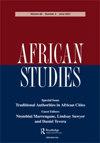Abdellah Taïa and an Emergent Queer African Islamic Discourse: Texts, Visibility and Intimate Archives
IF 0.9
4区 社会学
Q2 AREA STUDIES
引用次数: 1
Abstract
ABSTRACT This article discusses the work of Abdellah Taïa, the first openly gay Moroccan novelist to write his queerness, as a major contribution to an emergent queer African Islamic discourse. Bringing Taïa’s work into conversation with diverse literary texts from elsewhere on the continent, the article makes two major interventions in the field of queer African studies. First, it centres Islam as a resource for queer agency, creativity and subjectivity in contemporary Africa. This addresses Western conceptions of queer politics and queer rights that operate on a largely secular, if not anti-religious and specifically anti-Islamic basis. Second, it renegotiates the marginality of North Africa, and especially the Maghreb, in queer African studies. This addresses problematic historic divisions between North and sub-Saharan Africa, and acknowledges the political, cultural and intellectual unity of the continent. The article demonstrates that literary works make visible queer lived experiences on the continent. Drawing on Michelle Caswell’s ideas of the ‘archiving of the unspeakable’ and Achille Mbembe’s concept of the ‘unarchivable’, this article adopts a ‘scavenger methodology’ to argue that literary works are important in creating an emergent queer African Islamic discourse as well as an alternative archive of African queer lived experiences.Abdellah Taïa和新兴的酷儿非洲伊斯兰话语:文本,可见性和亲密档案
摘要本文讨论了摩洛哥第一位公开同性恋小说家Abdelah Taïa的作品,他写下了自己的酷儿,这是对新兴的非洲-伊斯兰酷儿话语的重大贡献。这篇文章将Taïa的作品与非洲大陆其他地方的各种文学文本进行了对话,对非洲酷儿研究领域进行了两次重大干预。首先,它将伊斯兰教作为当代非洲酷儿能动性、创造力和主体性的资源。这涉及到西方对酷儿政治和酷儿权利的概念,这些概念在很大程度上是世俗的,如果不是反宗教的,特别是反伊斯兰的。其次,它重新谈判了北非,尤其是马格里布在酷儿非洲研究中的边缘性。这解决了北非和撒哈拉以南非洲之间存在问题的历史分歧,并承认了非洲大陆的政治、文化和知识统一。这篇文章表明,文学作品在非洲大陆创造了明显的酷儿生活体验。本文借鉴了米歇尔·卡斯韦尔的“无法言说的存档”思想和阿希尔·姆本贝的“无法解释的”概念,采用了“拾荒者方法论”,认为文学作品在创造一个新兴的非洲酷儿伊斯兰话语以及一个非洲酷儿生活经历的替代档案方面很重要。
本文章由计算机程序翻译,如有差异,请以英文原文为准。
求助全文
约1分钟内获得全文
求助全文

 求助内容:
求助内容: 应助结果提醒方式:
应助结果提醒方式:


